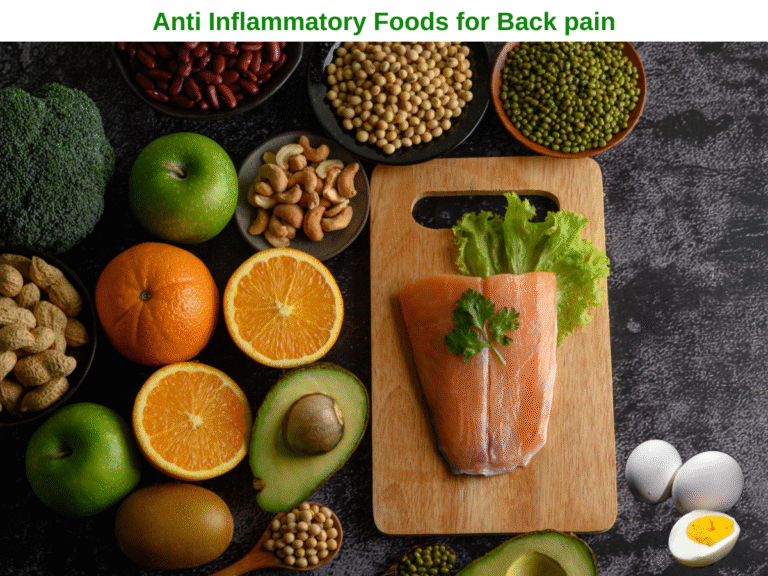
Eat to Heal: Diet Tips for Back Pain, Sciatica, and Disc Problems
Back pain is one of the most common health issues today, and while most people associate diet plans only with weight loss or digestive problems, nutrition plays a much bigger role. The right diet can help reduce inflammation, helps repair tissues and muscle health, and ease pain naturally.
One important aspect to focus on is anti-inflammatory foods. When the body experiences an injury or strain, its natural defense system activates. White blood cells rush to the affected area, causing inflammation — which shows up as redness, pain, or swelling. While this is a normal healing response, prolonged inflammation can make back pain worse or slow down recovery.
This is where anti-inflammatory foods play a key role. They help calm the body’s inflammatory response, support tissue repair, and reduce discomfort naturally.
In this article, let’s explore how a balanced naturopathic diet can support healing in conditions like back pain, slipped disc, and sciatica.
Turmeric
Turmeric has been used for centuries in traditional medicine, particularly in Ayurveda, for its healing and anti-inflammatory properties. It is a powerful natural medicine. The key compound in turmeric is curcumin, which is known to reduce inflammation in the body. In the context of back pain, sciatica, or disc problems, inflammation in muscles, nerves, and joints can worsen pain and stiffness. Curcumin helps calm this inflammatory response, supporting faster recovery and improved mobility. About ½ teaspoon of turmeric in your daily diet is sufficient for general anti-inflammatory benefits.
- Pair with Black Pepper: Turmeric’s active compound curcumin is not easily absorbed on its own. Combining it with piperine (black pepper) significantly improves absorption.
Benefit: Regular intake can help reduce chronic inflammation, ease stiffness, and support joint health.
Omega-3 Fatty Acids
Omega-3s are essential fats that reduce inflammation and protect nerve and muscle health. They can help manage pain and promote recovery in back and disc conditions.
Sources:
- Vegetarians: Leafy greens like spinach, flaxseeds, chia seeds, and walnuts.
- Non-Vegetarians: Fatty fish such as sardines, mackerel, and salmon.
Benefit: Omega-3s contain EPA and DHA, which are potent anti-inflammatory agents supporting overall back health and support natural healing.
Fruits and Vegetables
Fresh fruits and vegetables provide essential vitamins, minerals, and antioxidants that help reduce inflammation and promote tissue repair.
Tips:
- Include a variety of colors—each provides unique nutrients.
- Citrus fruits, berries, leafy greens, and cruciferous vegetables are particularly beneficial.
Benefit: Supports the immune system, improves healing, and keeps the body nourished.
Reduce High-Sugar and Processed Foods
Processed foods, refined sugar, trans fats, and artificial colors can increase inflammation, worsen pain, and affect overall health. Minimizing these foods supports lifestyle medicine approaches for back pain.
Tips:
- Minimize sugary drinks, packaged snacks, and baked goods.
- Replace with whole grains, fruits, and natural snacks.
Benefit: Helps maintain stable blood sugar and reduces inflammatory triggers.
Avoid Alcohol and Tobacco
Alcohol and tobacco can negatively affect muscles, nerves, and overall posture. Alcohol relaxes muscles excessively, leading to improper posture, while tobacco affects nerve health and slows healing.
Essential Vitamins and Minerals
Certain vitamins and minerals are crucial for bone, muscle, and nerve health.
- Vitamin D: Helps the body absorb calcium, strengthens bones, and supports muscle function. Sunlight is the best natural source (aim for 15–20 minutes daily with minimal clothing). Dietary sources include fortified milk, eggs, and fatty fish.
- Vitamin B12: Essential for nerve health and maintaining healthy blood cells. Deficiency can contribute to nerve pain or numbness, which worsens back issues. Eggs, fish, meat, and dairy are the best source for Vitamin B12. Vegetarians may need supplements or fortified foods. They support nerve regeneration and reduce nerve-related pain symptoms.
- Vitamin C: A powerful antioxidant that aids tissue repair and collagen formation, which is vital for discs and connective tissues in the spine. Best source includes citrus fruits (oranges, lemons), guava, bell peppers, kiwi, and berries.
- Magnesium, Calcium, Zinc: Sources includes nuts, whole grains, wheatgrass, spinach, and leafy vegetables. These minerals help maintain bone density and supports skeletal strength.
Benefit: Deficiency in these nutrients can increase pain, inflammation, and slow recovery.
Protein and Healthy Fats
Proteins and healthy fats are crucial for muscle strength, tissue repair, and overall spinal support.
Protein
Protect and repair muscles, tendons, and ligaments.
Vegetarian sources: paneer, soya, tofu, lentils, and nuts.
Non-vegetarian sources: eggs, fish, chicken, and lean meat.
Healthy Fats
Reduce inflammation and support nerve health.
Plant sources: ghee, flaxseeds, chia seeds, walnuts, olive oil.
Non-veg sources: fatty fish such as sardines and mackerel.
Benefit: A balanced intake of protein and healthy fats strengthens the muscles around the spine, reduces inflammation, and enhances overall mobility.
Hydration
Keeps your muscles flexible. Adequate water intake is crucial for muscle function, joint lubrication, and toxin removal. Drink 3–4 liters of water daily, more if you are active. Proper hydration is a simple but effective natural medicine strategy for reducing back pain.
Benefit: Prevents muscle cramps, reduces stiffness, and supports overall healing.
Summary
A well-balanced, anti-inflammatory diet plays a crucial role in managing back pain, sciatica, and disc problems. Focus on whole foods, essential vitamins, proteins, healthy fats, and hydration while avoiding processed foods, alcohol, and tobacco. Combined with the right therapies and lifestyle habits, this approach can support long-term back health and overall well-being.
Every individual’s body and condition are unique. While general guidelines are helpful, a personalized diet chart can make a significant difference in managing back pain, sciatica, or disc problems. At Nisarga Hospital, our naturopathic doctors assess your health condition, lifestyle, and dietary habits to design customized diet plans that complement your therapy and enhance recovery.
Take the Next Step
Diet plays a crucial role in reducing inflammation, supporting muscle and joint health, and improving your overall well-being. Combine it with natural therapies like yoga, physiotherapy, and hydrotherapy for the best results.
Consult a naturopathic doctor at Nisarga Hospital, Sirsi, to get a personalized diet and wellness plan tailored to your needs. Your back deserves the right care—start your healing journey today.

